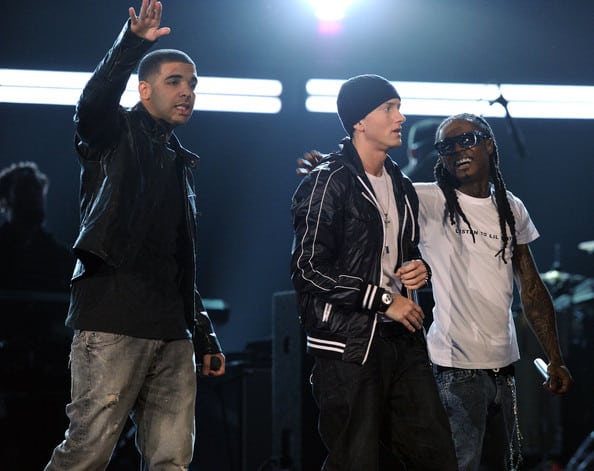Rap Music referencing Mental Health Struggles doubled in the last two decades. Songs from Eminem, Lil Wayne, Drake & more
According to a new study, the number of popular rap songs mentioning mental health has more than doubled in the last two decades, highlighting the need to look at how rap music may help to remove the stigma surrounding mental illness. According to research by Scientists from the University of North Carolina at Chapel Hill, Rappers rapping about mental health struggles may help reduce depression in the youth. After analyzing the lyrics of the 25 Top Rap songs in the US in 1998, 2003, 2008, 2013, and 2018, scientists suggest that Rap songs from top artists like Eminem, Lil Wayne, and Drake referencing topics like depression, anxiety and suicide increased more than double over the past two decades.
Scientists say that the release of such music coincides with a rise in suicide among Black teenagers, who make a “Significant portion of rap music’s large and growing audience“. One of the most popular tracks talking about suicide is Logic’s “1-800-273-8255“, which is titled after the phone number of the American National Suicide Prevention Lifeline.
Although it’s still unclear how this rap music may influence a listener’s mental health, the team hope mainstream records referencing emotional struggles may help reduce the stigma around issues like depression.
“These artists are considered the ‘coolest’ people on earth right now. The fact they are talking about mental health could have huge implications for how young people perceive mental health or how they look at themselves if they struggle with mental health, which we know millions and millions of young people do.” says Alex Kresovich, lead author and a former music producer.
For the study, researchers looked at lyric sheets from the top 25 rap songs in the United States in 1998, 2003, 2008, 2013, and 2018. The majority of the lead performers were black men, and roughly one-third of their songs dealt with anxiety, 22% with despair, and 6% with suicide.
Out of the analysis from a total of 125 songs, 35 (28%) references anxiety, 20 (22%) allude to depression, 8 (6%) references to suicide, while 26 (21%) used mental health metaphor like “pushed to the edge” or “fighting my demons.
The research also revealed that in the last 20 years, depression references in rap music increased from 16% to 32% and mental health metaphors increased from 8% to 44%. Suicide rates among black youths, who make up a big chunk of rap music’s enormous and rising audience, have risen to new highs as psychological stress among those aged 18 to 25 has reached new highs.
Among 18 to 25-year-olds in the US, “Psychological stress and suicide risk” increased substantially.
The most prevalent mental health stressors in the songs Krescovich and Collins examined and categorised for the study were love and environmental concerns.
However, the authors of the study had difficulty deciphering artists’ intended meaning behind their songs, and the analysis was unable to establish whether listeners viewed the messages as positive or negative. The increase of mental health references in rap songs was the most surprising finding in the study. These analogies may aid in comprehending the terminology used to explain mental health. “Using metaphors may be a safe way to avoid being judged,” Kresovich says. “For men, especially men of color, mental health is still stigmatized. “Artists are treading lightly and aren’t going to say, ‘I’m depressed.’ But what they will do is describe feelings in a way that others with depression can understand and relate to,” he says, adding. “It also just may be really hard to rhyme the word ‘depression’ in a song.”
Check out the full story on Yahoo News Here.








